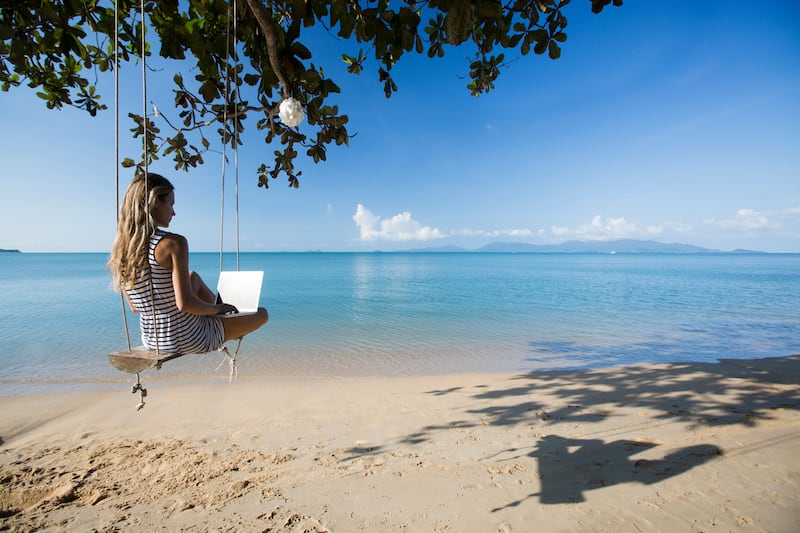Remote working has been gaining traction over the past few years, and the pandemic catapulted the popularity (and feasibility) of this career option to new heights.
Not only does it give workers flexibility, but it lets them explore new pastures every few months or so – or until their local visa runs out. These days, you can work remotely in a wide range of industries, from creative fields to the health sector and even HR roles.
Great weather, co-working spots with panoramic views, fast connectivity and tailor-made visa options are only a few of the reasons why, according to research studies and digital nomads themselves, the following cities come out on top year after year.
Dubai

The home of the tallest building in the world, some of the planet's plushest hotels and a highly regarded culinary landscape, Dubai is a city remote workers are jostling to live in.
That's why property consultancy Savills ranked it the best in the world for remote workers in its Executive Nomad Index. Abu Dhabi came in fourth in the index, which rates the world's top cities for long-term remote workers, based on internet speed, quality of life, climate, air connectivity and prime rents.
Dubai is ranked sixth in a report by Instant Offices, a company that matches businesses with flexible working spaces. The study ranked almost 80 locations based on affordability, weather, broadband speed and more.
Users on Nomadlist, a community resource and database for digital nomads, rank it highly for safety, standard of living, happiness and healthcare. The quality and volume of co-working spaces in the city are also highly rated.
"I was in Dubai for one week," says one Nomalist user. "It's the best place for doing business and a modern lifestyle. You can see an impressive infrastructure and what mankind can build."
Visa situation: The UAE offers a residence permit for remote working that allows people to live in the Emirates but work for a company that does not operate in the country. The UAE is also finalising the terms of a flexible working permit to allow freelance work by employees of all skills.
Lisbon

The culture and culinary scenes of Lisbon are among the reasons why the Portuguese capital is a very popular destination for flexible workers.
The city is currently in the top 10 on numerous rankings, including Nomadlist, travel documentation service iVisa and Savills, as well as number one for Instant Offices.
Lisbon ranks particularly high for friendliness, a lack of crime and racism, air quality, number of decent co-working spaces and walkability, according to Nomadlist users. "Lisbon, the pulsating heart of Portugal, is an amazing and stunning city that caters to every nomad's whims and desires," writes one nomad. "A vibrant metropolis buzzing with energy, this place offers an endless array of activities and sights, from surfing the waves to diving in the azure waters of Cascais."
Others, however, warn that prices are increasing and that it's getting overcrowded and touristy.
Visa situation: Portugal launched its digital nomad visa or Portugal D7 visa in October for people who earn about $2,750 a month. It allows remote workers to apply for a temporary stay of up to a year or a residency permit that can be renewed for up to five years.
Chiang Mai and Bangkok
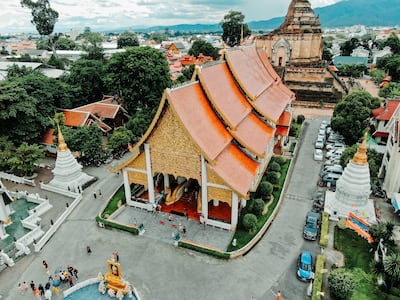
Both of these Thai cities are known as hubs for freelancers, which is why they're rising stars on Nomadlist, with Bangkok ranking second among users and Chiang Mai coming in sixth.
Bustling Bangkok, which also rates second on Instant Offices' list, is Thailand's capital and most populous city, so opportunities for work and co-working spaces are rife, but it also scores highly for quality of life, cost of living, safety, walkability, healthcare and friendliness.
Chiang Mai, a city in the mountainous north, is steeped in history, particularly the Old City, and it's home to hundreds of Buddhist temples. Its temperature is also perfect for about nine months of the year.
"CM is down-to-earth, relaxed pace of life," writes one Nomadlist user. "Most people love CM but can't figure out why, because it's not visual, it's a feeling of stability and peace of mind around this area."
Visa situation: Thailand has launched its Long-Term Resident (LTR) visa with Work-from-Thailand Professionals as a category under this umbrella, which allows remote workers to conduct business in the country. They must have at least $80,000 of annual income for two years before they apply, a master's degree or intellectual property.
Canggu and Ubud

For decades, Bali has been popular for longer stays. However, recently, digital nomads have flocked to the island's tempting shores to enjoy the peaceful life of working surrounded by beautiful views, in between surfing sessions and enjoying delicious food in a thriving culinary scene.
Canggu, which is number one on Nomadlist, is most famous as a spot for remote workers, with plenty of affordable co-working space options and a community of like-minded individuals to settle down with. But some would argue it's now too famous, overrun with tourists and new expatriates looking for a slice of the good life.
As a result, Ubud is an up-and-coming spot and is ranked fifth on the travel website By Digital Nomads. It might not be by the sea, but the natural landscapes, with rice paddies and its monkey forest, are a major draw, as are the myriad cafes with panoramic views.
It's worth noting, however, that Bali has seen an unprecedented influx of holidaymakers this year, including some troublemakers, sparking local authorities to put in place stricter rules, such as the need for visitors to hold official licences to use scooters (the easiest way of getting around) and a ban on mountain hiking.
Visa situation: Indonesia offers the B211a visa, which is valid for 60 to 180 days and those with 60-day visas can extend it twice. The country is also working on a five-year "digital nomad" visa, and a range of other initiatives for foreigners, but they're yet to launch.
Mexico City
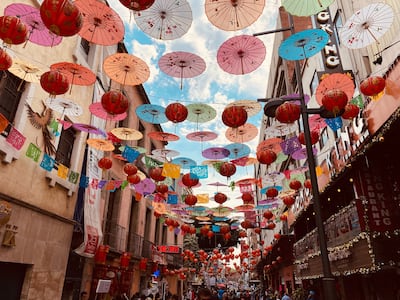
While visitors need to keep their wits about them while travelling to Mexico, its capital is becoming a popular pit stop for remote workers. It comes in fourth on iVisa's top destinations for digital nomads this year thanks to its rich cultural scene that's steeped in history, beautiful neighbourhoods, an enviable food and nightlife scene, as well as affordability.
If you prefer a laid-back beach life, then Mexico City isn't for you, but for a change of pace, it's a great option. On Nomadlist, users like it for the quality of life the city offers, but also the sense of community and how fun it can be. Friendliness, walkability and air quality are other areas it scores high in, as well as co-working spaces. Users warn it isn't particularly safe, though.
"As a nomad or expat, I love it here," writes one user in the review section. "If I was in my twenties, I would easily live here for five-plus years. But as a 34-year-old man who wants to settle down soon, I don't know if it's really the place for that."
Visa situation: It doesn't have a digital nomad visa as such, but Mexico has a temporary residence visa that allows remote workers to stay for up to a year and that can be renewed.
Budapest
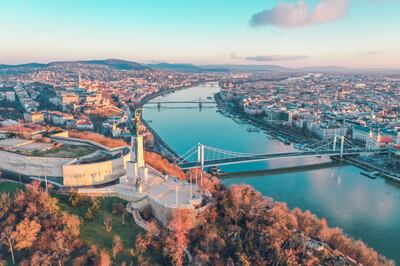
The Hungarian capital is steeped in history, with fascinating architecture, beautiful landscapes and unique tourist attractions such as the series of underground caves and thermal spas. But it's also known for its restaurants, nightlife, affordability and fast Wi-Fi – essentially a digital nomad's dream.
By Digital Nomads ranks it eighth, writing the old city has a lot of "charm" and that you'd be looking at a $1,460 cost of living per month. "If you want to experience Europe without breaking the bank, Budapest is a great choice," it adds.
On Nomadlist, users love it for its quality of life, community feel, safety, walkability and, again, the fast Wi-Fi. It's also well known for having cool and quirky co-working spaces. "Very beautiful city, vibrant, lots of things to do and moving around is so easy compared to other 'big' capitals," writes one user.
Visa situation: Hungary's digital nomad visa is known as the White Card, which allows remote workers to work in the country as long as they can prove they have a monthly income of €2,000 ($2,170).
Barcelona and Malaga

Spanish cities shot up the charts this year as the country launched its own digital nomad visa. Barcelona, in particular, captures travelling workers' imaginations thanks to its energy, beautiful architecture, countless cafes and co-working spaces, plus ultra-fast internet speeds. That's why Savills and By Digital Nomads rank it within their top 10 and Instant Offices has it in the top 20.
Malaga, however, takes second place overall for Savills due to its focus on culture, gastronomy and affordability.
Meanwhile, Nomadlist users rank Gran Canaria and Fuerteventura, both destinations in the Canary Islands, higher than any other Spanish cities. Of Gran Canaria, one user wrote: "Amazing place. Great weather. Great internet. Amazing beaches. After living in 30 countries, this place is my top one."
Visa situation: Spain officially launched a digital nomad visa in February. Applicants are required to have a monthly income of about $32,445 a year.
Ho Chi Minh City
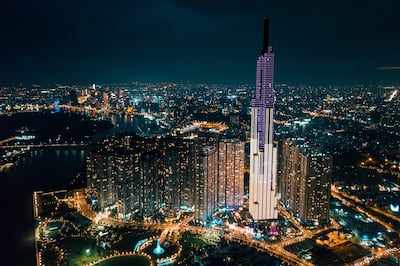
Vietnamese cities are designated rising stars on Nomadlist, but iVisa names Ho Chi Minh City the third-best destination for digital nomads this year, because of the "divine" street food, inexpensive accommodation and high-speed internet, plus a burgeoning community of remote workers.
It's also in the top 10 for Instant Offices and By Digital Nomads, which says "it has everything digital nomads could ask for" and that you'll meet many like-minded creatives in the capital.
It's the economic heart of Vietnam, with a dense population, and so has a fast-paced energy, but with plenty of cultural hot spots to explore, including museums where you can learn about the country's war history. The classic colonial architecture with French influence is also a sight to behold.
Users on Nomadlist do warn against the heat, however, and as the air-conditioning situation isn't up to scratch, it can make some warmer days "unbearable", particularly when walking around outside.
Da Nang, Hanoi and Hoi An are also popular spots for remote workers in Vietnam.
Visa situation: There is no specific digital nomad visa here, but there are a range of options that can be used by remote workers, including a visa on arrival, which is applicable to most countries and allows stays of up to 90 days. Alternatively, there's also a business, or DN, visa, which can be used by entrepreneurs wanting to complete business activities in the country, such as meetings or conferences.
